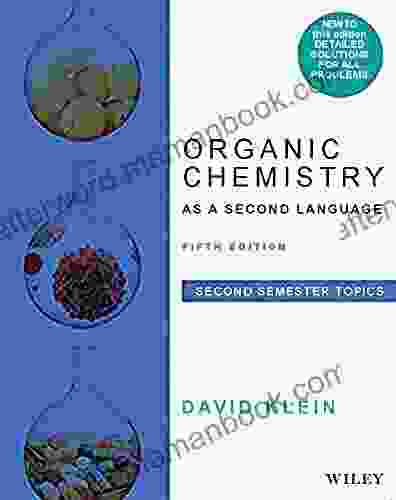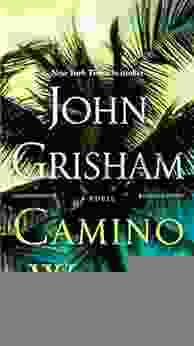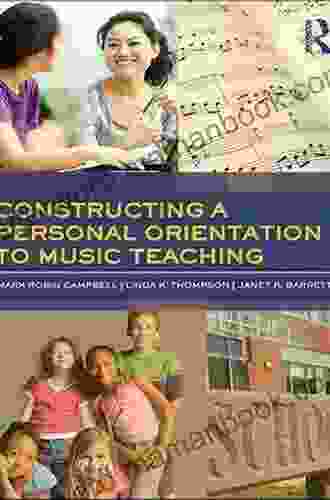Organic Chemistry: An Unraveled Enigma for Non-Native Speakers

Delving into the realm of organic chemistry can be akin to embarking on a linguistic expedition for non-native English speakers. The subject's intricate terminology and abstract concepts may seem like an unyielding cipher, leaving many students feeling lost in translation.
4.7 out of 5
| Language | : | English |
| File size | : | 11931 KB |
| Screen Reader | : | Supported |
| Print length | : | 400 pages |
| Lending | : | Enabled |
However, with the right strategies and unwavering determination, it is entirely possible to unravel the complexities of organic chemistry and emerge as a proficient speaker of this scientific language.
Understanding the Jargon
The cornerstone of success in organic chemistry lies in deciphering its specialized jargon. Many terms derive from Greek or Latin roots, further complicating their comprehension for non-native speakers.
Instead of attempting to memorize each term verbatim, focus on understanding their underlying roots and patterns. For instance, the prefix "iso" often implies structural isomers, while the suffix "ene" indicates compounds containing a double bond.
Grasping the Concepts
Beyond the jargon, an in-depth understanding of organic chemistry concepts is essential. The interplay of valence electrons, molecular orbitals, and reaction mechanisms can seem daunting at first.
To conquer this challenge, break down complex concepts into smaller, manageable chunks. Use visual aids like diagrams and models to enhance your comprehension. Practice drawing Lewis structures and predicting reaction pathways to reinforce your understanding.
Developing a Study Strategy
Crafting an effective study strategy is crucial for mastering organic chemistry. Here are some time-tested tips:
- Prioritize vocabulary building: Dedicate time to studying the subject's terminology. Use flashcards, create your own glossary, or utilize online resources.
- Engage in active learning: Passively reading textbooks is not enough. Solve problems, participate in discussions, and work through practice exams to actively engage with the material.
- Seek clarification promptly: Do not hesitate to ask for help when encountering confusing concepts. Attend office hours, join study groups, or seek online support to clarify any misunderstandings.
- Study consistently: Organic chemistry is not a subject that can be crammed at the last minute. Consistency is key to building a solid foundation and retaining information.
- Utilize visual and spatial cues: Draw molecular structures, create flowcharts, and use other visual aids to reinforce your understanding of abstract concepts.
Overcoming Common Challenges
Non-native English speakers often face additional hurdles when studying organic chemistry. These include:
- Language barriers: Unfamiliar terminology and technical jargon can pose significant challenges. However, by focusing on root words and patterns, these barriers can be overcome.
- Cultural differences: Approaches to scientific inquiry may vary across cultures. Non-native speakers should be aware of these differences and adapt their learning strategies accordingly.
- Lack of native support: In some cases, non-native speakers may not have access to native English speakers who can provide support and guidance. Joining online forums or connecting with international student organizations can help bridge this gap.
Embracing the Challenge
While learning organic chemistry as a non-native English speaker presents unique challenges, it also offers opportunities for growth and self-discovery.
By embracing the challenge, developing effective study strategies, and seeking support when needed, non-native speakers can not only master organic chemistry but also gain valuable skills in problem-solving, critical thinking, and scientific communication.
Organic chemistry is a challenging subject for all, but it can be particularly daunting for non-native English speakers. By understanding the jargon, grasping the concepts, developing effective study strategies, and overcoming common challenges, it is possible to succeed in this field.
Remember, learning organic chemistry as a non-native English speaker is not merely about mastering a new language but about expanding your knowledge, embracing diversity, and unlocking your full potential.
4.7 out of 5
| Language | : | English |
| File size | : | 11931 KB |
| Screen Reader | : | Supported |
| Print length | : | 400 pages |
| Lending | : | Enabled |
Do you want to contribute by writing guest posts on this blog?
Please contact us and send us a resume of previous articles that you have written.
 Top Book
Top Book Novel
Novel Fiction
Fiction Nonfiction
Nonfiction Literature
Literature Paperback
Paperback Hardcover
Hardcover E-book
E-book Audiobook
Audiobook Bestseller
Bestseller Classic
Classic Mystery
Mystery Thriller
Thriller Romance
Romance Fantasy
Fantasy Science Fiction
Science Fiction Biography
Biography Memoir
Memoir Autobiography
Autobiography Poetry
Poetry Drama
Drama Historical Fiction
Historical Fiction Self-help
Self-help Young Adult
Young Adult Childrens Books
Childrens Books Graphic Novel
Graphic Novel Anthology
Anthology Series
Series Encyclopedia
Encyclopedia Reference
Reference Guidebook
Guidebook Textbook
Textbook Workbook
Workbook Journal
Journal Diary
Diary Manuscript
Manuscript Folio
Folio Pulp Fiction
Pulp Fiction Short Stories
Short Stories Fairy Tales
Fairy Tales Fables
Fables Mythology
Mythology Philosophy
Philosophy Religion
Religion Spirituality
Spirituality Essays
Essays Critique
Critique Commentary
Commentary Glossary
Glossary Bibliography
Bibliography Index
Index Table of Contents
Table of Contents Preface
Preface Introduction
Introduction Foreword
Foreword Afterword
Afterword Appendices
Appendices Annotations
Annotations Footnotes
Footnotes Epilogue
Epilogue Prologue
Prologue Bryant Terry
Bryant Terry Universal Politics
Universal Politics Olivie Blake
Olivie Blake Lauri Hamalainen
Lauri Hamalainen J W Hagarty
J W Hagarty Ellora Sutton
Ellora Sutton Pedro E Acevedo
Pedro E Acevedo Jeanne Steig
Jeanne Steig Donis Casey
Donis Casey Phil O Viljoen
Phil O Viljoen Derek Miller
Derek Miller Edugorilla Prep Experts
Edugorilla Prep Experts Abigail Wild
Abigail Wild Sheetal Venugopal
Sheetal Venugopal William Martin
William Martin Suzy Pepper Rollins
Suzy Pepper Rollins H P Lovecraft
H P Lovecraft Gavin De Becker
Gavin De Becker Carl Hiaasen
Carl Hiaasen Ted Olson
Ted Olson
Light bulbAdvertise smarter! Our strategic ad space ensures maximum exposure. Reserve your spot today!

 Robin PowellCraters of the Moon National Monument: Unraveling the Secrets of a Volcanic...
Robin PowellCraters of the Moon National Monument: Unraveling the Secrets of a Volcanic... Jonathan FranzenFollow ·11.7k
Jonathan FranzenFollow ·11.7k J.D. SalingerFollow ·18.8k
J.D. SalingerFollow ·18.8k Robin PowellFollow ·14k
Robin PowellFollow ·14k Andy HayesFollow ·13.2k
Andy HayesFollow ·13.2k Hugh ReedFollow ·2.7k
Hugh ReedFollow ·2.7k Arthur Conan DoyleFollow ·8.2k
Arthur Conan DoyleFollow ·8.2k Jeffrey CoxFollow ·16.4k
Jeffrey CoxFollow ·16.4k Rodney ParkerFollow ·11.8k
Rodney ParkerFollow ·11.8k

 Bryce Foster
Bryce FosterViolin Is Easy: A Comprehensive Guide for Beginners
The violin is a...

 Cristian Cox
Cristian CoxThe True Story Of The Ivy League Cowboys Who Raided The...
In the early 2000s, a group of Ivy League...

 Ken Follett
Ken FollettUnraveling the Enchanting World of Menewood: A...
Embark on an enthralling...
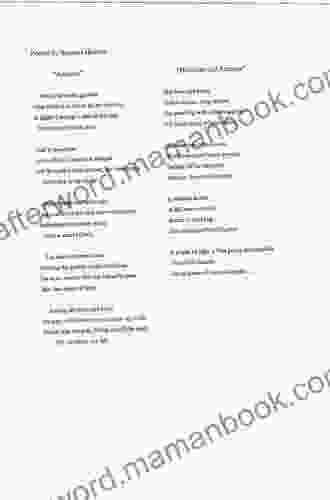
 Phil Foster
Phil FosterNorth Poems by Seamus Heaney: An Exploration of Place,...
Seamus Heaney's North...
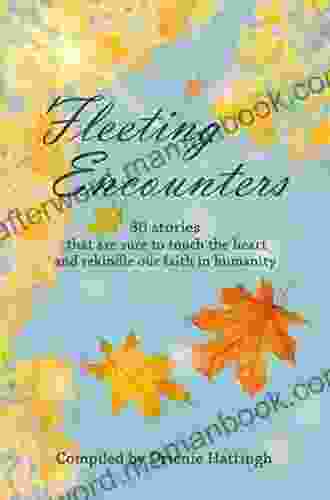
 Jack Butler
Jack ButlerFleeting Encounters: The Enigmatic Transience of Maria...
In the annals of literary history, fleeting...

 Eliot Foster
Eliot FosterA Haiku Summer: Capturing the Essence of the Season in...
Summer is a time of warmth,...
4.7 out of 5
| Language | : | English |
| File size | : | 11931 KB |
| Screen Reader | : | Supported |
| Print length | : | 400 pages |
| Lending | : | Enabled |


